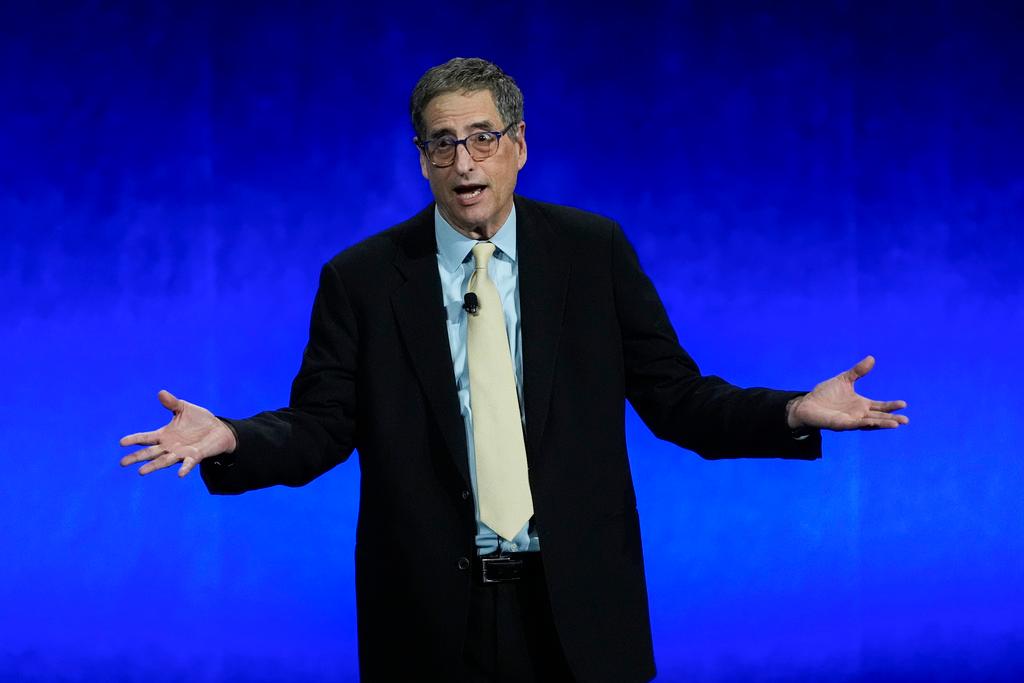For 35 years, O.S. Arun has been a professional singer of Carnatic music, a classical genre popular in South India. It's an embellished form of singing frequently backed by the tanpura, a long-necked, stringed instrument that emits a constant drone. He's recorded several dozen albums.
Arun is famous for adapting outside songs to Carnatic style. He once performed a Carnatic version of "Danny Boy" onstage in Ireland. He also played a Carnatic tribute to the late Beatle George Harrison alongside the Indian musician Ravi Shankar and others at London's Royal Albert Hall during a concert featuring Eric Clapton and Ringo Starr.
But this summer, when Arun advertised a concert of Christian hymns in Carnatic style, social media erupted, calling him a traitor to his Hindu faith.
"I'm Hindu — 100 percent Hindu! And that's the beauty of Carnatic music. It is very, very easy to adapt yourself to any style," Arun tells NPR. "[You can] explore different genres, out of love for music — not that I want to convert to any other religion. Come on, give me a break!"
Most Carnatic songs are devotional, in praise of Hindu deities. Some verses are from as early as the 2nd century, but most were composed from the 16th century onward, especially during the 18th and 19th centuries.
It's improvisational, like jazz, but relies most heavily on accompaniment from the violin, flute, tanpura and percussion instruments like the mridangam, a type of double-headed drum.
Carnatic music is built on an intricate and highly technical system of ragas, or melodic modes, and thalas, or rhythmic cycles. Devoted fans are rasikas.
Many Carnatic songs are in Tamil, one of the languages spoken in parts of South India where Carnatic singing is most popular. Some songs are also in other regional languages including Telugu, Kannada and Malayalam, which is spoken mostly in the southern Indian state of Kerala, where there is a large Christian population.
Out of India's 1.3 billion people, the greatest number are Hindus, followed by Muslims and then Christians.
Arun is based in Chennai, formerly known as Madras, the capital of India's Tamil Nadu state. He sings in Tamil, but also in English and Hindi, a language he learned in northern India. He's traveled widely.
He and other Carnatic singers have long included songs based on Christian themes or Muslim poetry in their repertoire. Arun has performed Carnatic versions of Urdu ghazals, lyric poems that trace their roots back to Arabic poetry. He has collaborated frequently with Samuel Joseph, a Tamil Christian violinist and composer who goes by the name Shyaam. Arun even wore a crucifix in a music video in the 1990s. It was never an issue, he says.
But it is now.
"O.S. Arun kept doing this and doing this, and somebody had to take notice at some point," says Laalithya Konduru, a doctor and amateur musician from Chennai who wrote a magazine op-ed criticizing Carnatic singers' inclusion of Christian lyrics. She calls South India's suddenly controversial music scene "the Carnatic Christian conundrum."
"It's not that they're singing about Jesus," she says. "It's that they're taking something inherently Hindu and trying to strip it of its roots. That's what people are finding offense with."
That offense has boiled over on Carnatic singers' Facebook and YouTube pages. They've been called "disgusting cretins." Arun has received threatening phone calls.
Much of the vitriol has come from Indians abroad, who've emigrated to the United States or Australia.
"When they're outside their own land, they like to find their own identity. They like to find their own roots — and when they find it, they stick to it. They're very protective of it," says Konduru, 28, who has lived and studied in both the U.S. and Australia.
One by one, Hindu temples in the U.S. that had been scheduled to host concerts this fall by Arun and another Carnatic star, T.M. Krishna, have said the singers are no longer welcome. Concerts have also been canceled in India.
When the secretary of Chennai's prestigious Music Academy wrote an article last month defending Arun's artistic freedom, there were calls for him to be fired.
Amid accusations that singers might be trying to stealthily convert listeners to Christianity by playing their music, the Carnatic singer Aruna Sairam tweeted that rumors that she had "modified" traditional songs were untrue and she would "never tamper with classical content" nor sing for "evangelical purposes" or "commercial gains."
But Krishna is defiant. After the Sri Siva Vishnu Temple in Maryland backed out of hosting one of his concerts this fall, Krishna vowed to release a new song each month about Jesus or Allah — just to spite his critics. Contacted by NPR, the temple refused to comment.
But this is not entirely about music. It's about politics, and the rise of Hindu nationalism in India.
"It's been there for a long time, and today there is a perception that the climate is now right for [Hindu nationalists] to speak," says M. Ramesh, a Chennai-based journalist and Carnatic singing fan.
Prime Minister Narendra Modi belongs to a Hindu nationalist political party, the BJP. Some of his followers believe India's Hindu identity is under threat. It's similar to the sentiments of some white nationalists in the U.S. who feel emboldened under President Trump, Ramesh says.
In India, such tensions have led to deadly communal violence in the past, and some warn they will again in the future.
"The government, I think, is not doing enough to stop these voices — extremist voices," Ramesh says.
But Konduru insists she's no extremist. She's a religious conservative, she says, defending the Hindu religious character of Carnatic music – and she doesn't want to be labeled a bigot. She accuses the left in India of unfairly labeling religious conservatives as regressive.
"They're suddenly like, 'Oh, them right-wingers.' They look down upon them. Why?" Konduru says. "Freedom of expression, freedom of speech, why can't it be for the other side as well?"
As a lover of Carnatic music — a rasika — Ramesh says this controversy is a shame, especially for a genre whose market is "shriveling." Carnatic music's small, loyal fan base could be expanded, he believes — and diversifying could be one way to achieve that.
"We need more and more people to listen. We need to take it abroad also. It's part of India's soft power, you see — like yoga. You can't do it if you say, 'well, Carnatic music shouldn't sing songs about Jesus Christ,'" he says.
For now, O.S. Arun is still experimenting with different lyrics — but only in the privacy of his own studio. He sings praise for the Hindu god Ram in the same song as the Buddha and Zoroaster, the founder of Zoroastrianism, another ancient religion that is still practiced in India.
But after the threats he received this summer, Arun has switched off social media and canceled a U.S. tour scheduled for the fall.
He shrugs. This may just be his karma, he says — to be caught between music and politics.
9(MDEyMDcxNjYwMDEzNzc2MTQzNDNiY2I3ZA004))








